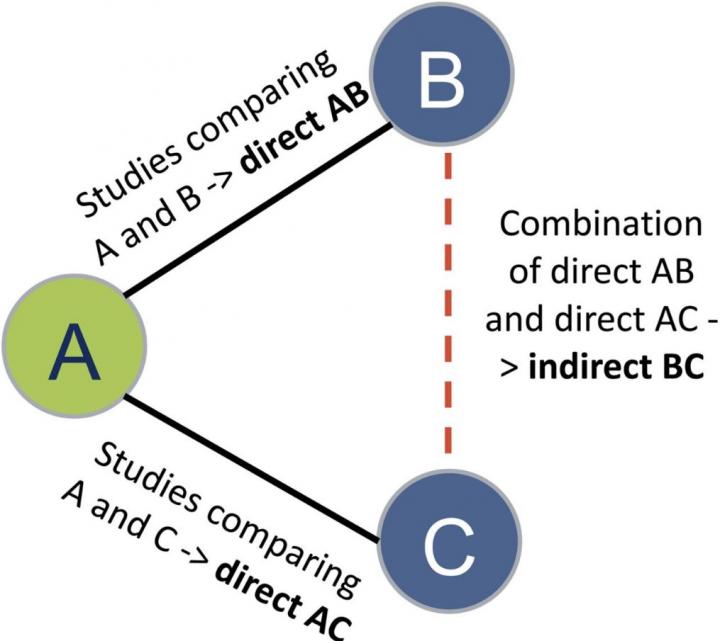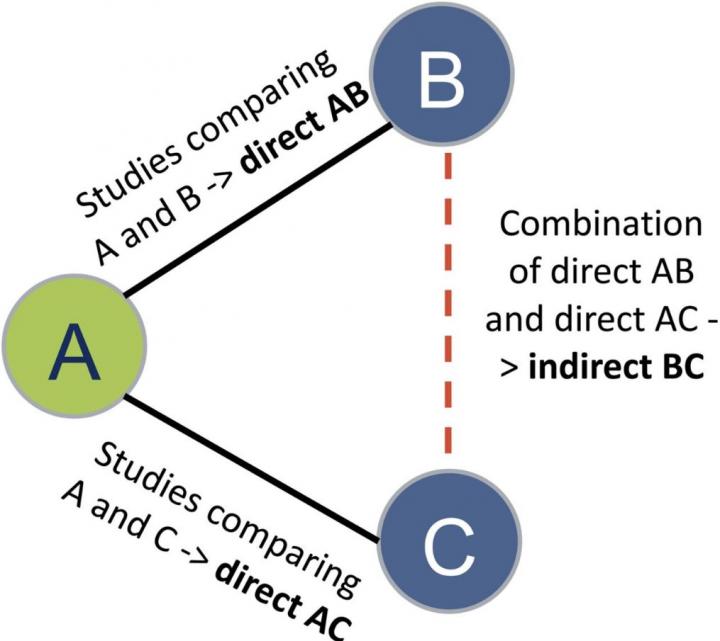
Credit: Lukas Schwingshackl et al. Journal of Lipid Research 2018
If you want to lower your low-density lipoprotein cholesterol, called LDL or, colloquially, "bad cholesterol," the research is clear about one thing: You should exchange saturated fats with unsaturated fat. If you want to know what you should use to sauté your dinner, that's a harder question to answer. Many of the studies establishing that mono- and polyunsaturated fats are better for blood lipids than saturated fats swapped out one food source at a time, making it hard to tell which of a plethora of vegetable oils might be most beneficial.
Lukas Schwingshackl, a researcher at the German Institute of Human Nutrition, is among a wave of scientists using sophisticated statistical tools to reduce uncertainty about what the mountain of data in the nutrition literature can tell us. In a paper published in the Journal of Lipid Research this month, Schwingshackl and colleagues used an emerging technique called network meta-analysis to extract insight from published studies on the effect of various dietary oils on blood lipids. The researchers found that seed oils were the best choice for people looking to improve their cholesterol.
To get around the fact that there has been no giant study comparing all available oils, Schwingshackl's team constructed a network meta-analysis showing how different oils and solid fats have in fact been matched up. The researchers rounded up 55 studies dating to the 1980s that assessed the effects of consuming the same amount of calories from two or more different oils on participants' blood lipids. To be included in the analysis, a study had to compare the effect of two or more oils or fats (from a list of 13) on patients' LDL, or other blood lipids like total cholesterol, HDL-cholesterol or triglycerides, over at least three weeks.
Suppose both butter and sunflower oil had been tested against olive oil. The statistical approaches of network meta-analysis allowed the team to infer a quantitative comparison between butter and sunflower oil, even if they had never faced off in the clinic. Schwingshackl explained, "The beauty of this method is that you can compare a lot of different interventions simultaneously… and, in the end, you get a ranking. You can say, 'this is the best oil for this specific outcome.'"
In this study, the final ranking indicated that, as your doctor has been telling you for years, solid fats like butter and lard are the worst choice for LDL. The best alternatives are oils from seeds. "Sunflower oil, rapeseed oil, safflower oil and flaxseed oil performed best," said Schwingshackl. "Some people from Mediterranean countries probably are not so happy with this result, because they would prefer to see olive oil at the top. But this is not the case."
There are a few important caveats to the research. For starters, it measured only blood lipids. "This is not a hard clinical outcome," said Schwingshackl. "LDL is a causal risk factor for coronary heart disease, but it's not coronary heart disease." However, he said, it might be difficult to conduct a study comparing those clinical outcomes — for starters, someone would need to find study participants willing to eat just one type of fat for years at a time.
Meta-analyses run the risk of misleading by combining several pieces of low-confidence data into a falsely confident-sounding ranking. In this case, for example, there was not enough evidence to choose a "winner" confidently among the seed oils. What's more, the oils best at lowering LDL were not the most beneficial for triglycerides and HDL cholesterol. However, with the appropriate caveats in mind, Schwingshackl is optimistic about the potential for network meta-analysis to help researchers synthesize disparate clinical studies in the future.
###
doi: 10.1194/jlr.P085522
This study was funded by NutriAct-Competence Cluster Nutrition Research Berlin-Potsdam, an initiative funded by the German Federal Ministry of Education and Research. Other authors on the study include Berit Bogensberger, Aleksander Ben?i?, Sven Knüppel, Heiner Boeing and Georg Hoffmann.
About the Journal of Lipid Research
The Journal of Lipid Research (JLR) is the most-cited journal devoted to lipids in the world. For over 50 years, it has focused on the science of lipids in health and disease. The JLR aims to be on the forefront of the emerging areas of genomics, proteomics, and lipidomics as they relate to lipid metabolism and function. For more information about JLR, visit http://www.jlr.org.
About ASBMB
The American Society for Biochemistry & Molecular Biology is a nonprofit scientific and educational organization with more than 11,000 members worldwide. Most members teach and conduct research at colleges and universities. Others conduct research in government laboratories, at nonprofit research institutions and in industry. The Society publishes three journals: the Journal of Biological Chemistry, the Journal of Lipid Research, and Molecular and Cellular Proteomics. For more information about ASBMB, visit http://www.asbmb.org.
Media Contact
Laurel Oldach
[email protected]
240-283-6648
@asbmb
http://www.asbmb.org
Related Journal Article
http://dx.doi.org/10.1194/jlr.P085522





